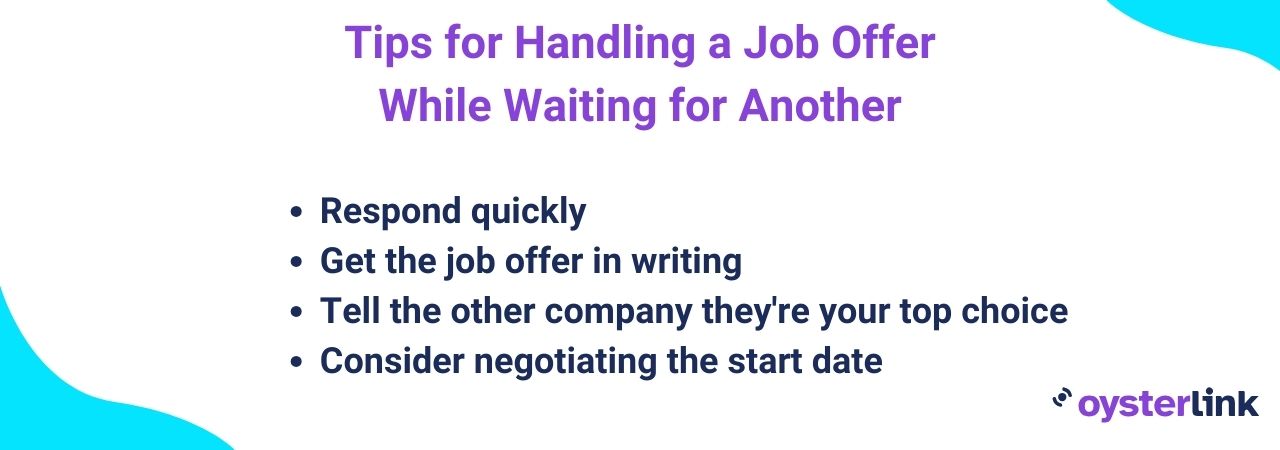Getting a job offer is exciting, but what happens when you find yourself waiting for other potential offers?
The key lies in finding the right balance — exploring opportunities without compromising your professionalism.
Let’s find out how to respond to a job offer while waiting on other offers without burning bridges.
How To Professionally Postpone Your Response to a Job Offer
Postponing your response to a job offer is a delicate matter that calls for a strategic approach. Here are the steps you can follow to professionally delay your response while maintaining a positive impression:
1. Express Gratitude for the Offer and Reiterate Interest in the Position
Start your response by expressing genuine gratitude for the job offer. This sets a positive tone and shows your appreciation for the opportunity presented to you. Acknowledge the time and effort the company has invested in the hiring process and show your excitement about the prospect of joining the company.
You can mention specific aspects of the offer that you find appealing to personalize your response and demonstrate a deeper understanding of what the role entails. This can leave a lasting positive impression on the hiring manager.
Example: “Thank you for offering me the Restaurant Manager position at [Company’s Name]. It’s an honor and I’m genuinely looking forward to potentially contributing to your team.
What truly excites me about this role is the opportunity to implement innovative strategies to enhance the overall guest experience — from refining menu offerings to optimizing operational efficiency.”
2. Politely Ask for More Time
After expressing gratitude, politely ask for additional time to consider the job offer. Make it clear that you want to make an informed decision and ensure that you are committing to a position that aligns with your career goals. This openness fosters trust and allows the hiring manager to decide whether or not to grant your request.
Example: “Before finalizing my decision, I need a bit more time to make sure the role aligns with my goals. If that works for you, could we discuss the deadline? I would greatly appreciate some clarity on when you need my final decision.”
3. Clearly Communicate Your Timeline
Once the hiring manager responds, be transparent about your timeline and ensure it aligns with the specified deadline.
Example: “I want to ensure that I will dedicate the time needed to fully evaluate this wonderful opportunity. To that end, I plan to finalize my decision on or before [specific date].”
4. End on a Positive Note
End your response on a positive and appreciative note by thanking the hiring manager for their understanding and patience in waiting for your decision. Assure them that you value the offer and the potential to contribute to their team.
Example: “Your patience is truly appreciated. I am genuinely excited about the possibility of joining [Company Name] as a Restaurant Manager.
Thank you once again for considering me for this wonderful opportunity. If there are any additional details or steps you’d like me to follow in the meantime, please don’t hesitate to let me know.”
4 Tips for Handling a Job Offer While Waiting for Another
Now that we have addressed how to respond to a job offer when waiting on others, let’s look at four essential tips for effectively navigating this situation.

1. Respond Quickly
When you receive a job offer but are still waiting to hear back from other potential employers, it’s crucial to respond promptly. Express your gratitude for the offer and let them know that you are carefully considering it.
Request a reasonable timeframe for making a decision, explaining that you want to give the offer the attention it deserves. This shows professionalism and respect for the employer’s time while giving you the space needed to explore other opportunities.
2. Get the Job Offer in Writing
To ensure clarity and avoid misunderstandings, request the job offer in writing. While verbal offers are common, having a written document ensures clarity and serves as a formal record of the terms and provides a reference point for any future discussions.
A written offer typically includes details such as:
- Salary
- Start date
- Benefits
- Job responsibilities
- Other important terms of employment
If the employer is unable to provide a formal offer letter immediately, ask for an email confirmation summarizing the key details discussed during the offer conversation. This can serve as a temporary written record until the formal offer letter is prepared.
Keep in mind that a written offer not only protects your interests but also demonstrates the employer’s commitment to the employment agreement. It’s a standard practice in the hiring process and contributes to a clear and transparent communication channel between you and the prospective employer.
3. Tell the Other Company They’re Your Top Choice
If the company you’re waiting an offer from is your top choice, let them know. Tell them they’re your top choice and ask about their decision timeline. This shows you’re committed and might speed up their decision-making process knowing you’re keen on the opportunity.
4. Consider Negotiating the Start Date
If you receive an offer but are still waiting on an offer from another company, and the start date proposed by the first company is imminent, consider negotiating the start date.
Explain to the employer that you are excited about this great opportunity but have a prior personal commitment. Clearly and professionally address your need for a slight adjustment in the start date, emphasizing your desire to ensure a smooth onboarding process for both you and the company.
Get more career advice delivered to your inbox
How To Choose Between Job Offers
In light of recent trends, it’s essential to approach job offers with careful consideration. According to Gartner HR Research’s survey from June 2022, a significant 44% of over 3,600 respondents admitted to reconsidering and backing out after initially accepting an offer.
This marks a notable increase from the 36% reported in 2019. Interestingly, the study also reveals that only 59% of individuals who recently accepted a job offer would do it again.

Given the dynamic nature of the job market, it’s crucial to make informed decisions when choosing between job offers. Here are eight useful tips to help you navigate this process effectively:
- Evaluate your priorities: Consider your personal and professional priorities. What aspects of a job are most important to you? This could include salary, benefits, work-life balance, career growth opportunities, company culture, location, etc.
- Consider long-term goals: Reflect on your long-term career goals and how each job aligns with them. Consider which opportunity provides a better trajectory for your career growth and personal development.
- Assess company culture: Evaluate the company culture of each potential employer. Consider factors like work environment, team dynamics, leadership style and whether the company’s values align with your own.
- Compare the offers: Create a side-by-side comparison of the different job offers. Look at key factors such as salary, benefits, job responsibilities, advancement opportunities and any other factors that are important to you.
- Seek input from others: Consult with mentors, friends or colleagues who may have valuable insights. They can provide different perspectives and share their experiences, helping you make a more informed decision.
- Create a pros and cons list: If you created a pros and cons list for each job offer, revisit it. This can help you visualize the advantages and disadvantages of each opportunity and make a more rational decision.
- Seek clarifications: If there are any uncertainties or questions about the job offers, seek clarifications from the respective companies. It’s important to have a clear understanding of all aspects before giving the final answer.
- Trust your instincts: Listen to your intuition about each opportunity. Consider how you felt during the interviews, your interactions with the interviewers and your overall impression of the company. Sometimes, your instincts can guide you in the right direction.
After careful consideration and weighing all factors, make your final decision. Communicate your decision professionally and express gratitude to the company whose offer you are declining.
Here are the most common reasons job seekers provided when asked to give one reason why they refused a job offer:
[Source: Bureau of Labor Statistics]
This chart is interactive. Hover your mouse over different parts of the chart to see detailed data.
Explore More Career Advice
Now that you learned how to respond to a job offer when waiting on other offers, consider checking out the following articles:
- How To Evaluate a Job Offer
- How To Accept a Job Offer
- How To Negotiate Salary After a Job Offer
- How To Decline a Job Offer
Stay tuned for more tailored advice and industry-specific recommendations to ensure your ongoing success.




